Key takeaways:
- Performance anxiety often arises from fear of negative judgment and perfectionism, making it essential to understand its underlying causes.
- Recognizing physical and mental symptoms, such as shallow breathing and racing thoughts, is crucial for developing effective coping strategies.
- Mental preparation techniques like visualization, deep breathing, and positive affirmations can significantly enhance confidence and reduce anxiety before performances.
- Seeking professional help can provide valuable insights and tools, leading to improved management of performance anxiety and fostering self-growth.
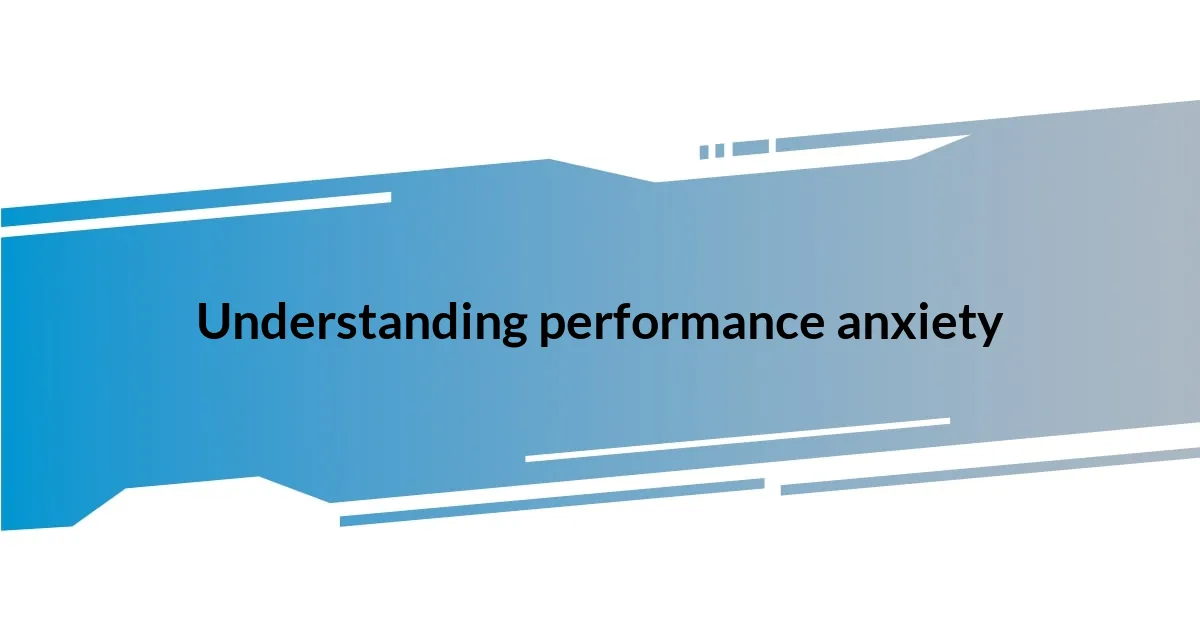
Understanding performance anxiety
Performance anxiety is a common feeling, often surfacing in high-pressure situations like presentations, auditions, or competitions. I remember my first public speaking experience; standing in front of an audience, my heart raced, and my palms were sweaty. It felt as if my entire worth hinged on that moment, leaving me to wonder why I let a simple scenario trigger such intense fear.
This anxiety can stem from a fear of negative judgment or the pressure to meet high expectations. I once cringed at the thought of forgetting my lines during a play, leading to sleepless nights. Have you ever felt that gnawing worry? It’s fascinating how our minds can trick us into believing that failure will be catastrophic, but often, it’s just a moment that passes, even if it feels monumental at the time.
Understanding the underlying mechanisms of performance anxiety is crucial. For me, it took time to recognize that it wasn’t just about the performance itself but the deeper issues of self-doubt and perfectionism. Isn’t it empowering to think that by addressing these root causes, we can gradually transform anxiety into a tool for growth?
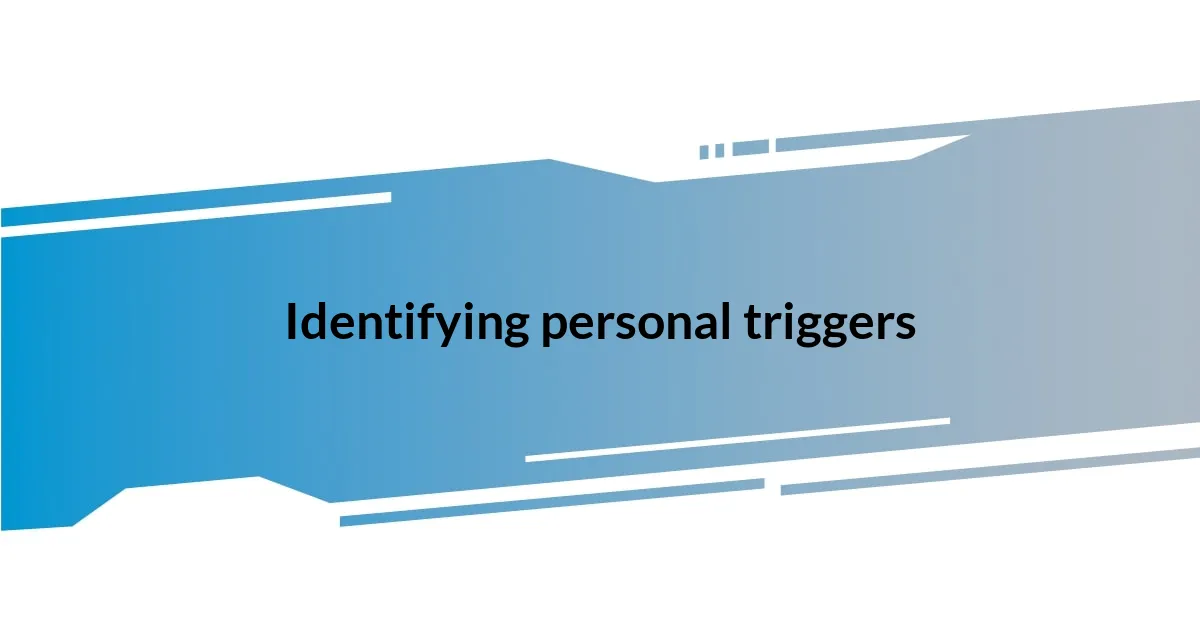
Recognizing symptoms of anxiety
Recognizing the symptoms of performance anxiety is the first step towards managing it. I’ve often noticed that my breathing changes; it becomes shallow, almost as if I’m preparing for a sprint. Have you had moments when your heartbeat feels alarmingly loud? It’s a physical reaction that our body has in response to perceived threats, like speaking in front of an audience or performing on stage.
Another symptom I relate to is the mental fog that can cloud my focus, making even simple tasks seem overwhelmingly difficult. In one particularly challenging rehearsal, I felt my palms sweating and my mind racing with worst-case scenarios. It was amazing and frustrating at the same time because those thought spirals can drown out the joy of performing.
Physical symptoms also manifest in different forms, like muscle tension or even nausea. I recall one nerve-wracking audition where my stomach felt like it had turned into knots. It’s a common experience; when we begin to recognize these signals, we can create strategies to address them. By acknowledging these symptoms, we take the first step towards reclaiming control over our nerves.
| Physical Symptoms | Mental Symptoms |
|---|---|
| Shallow breathing | Racing thoughts |
| Muscle tension | Mental fog |
| Increased heart rate | Fear of failure |
| Nausea | Negative self-talk |
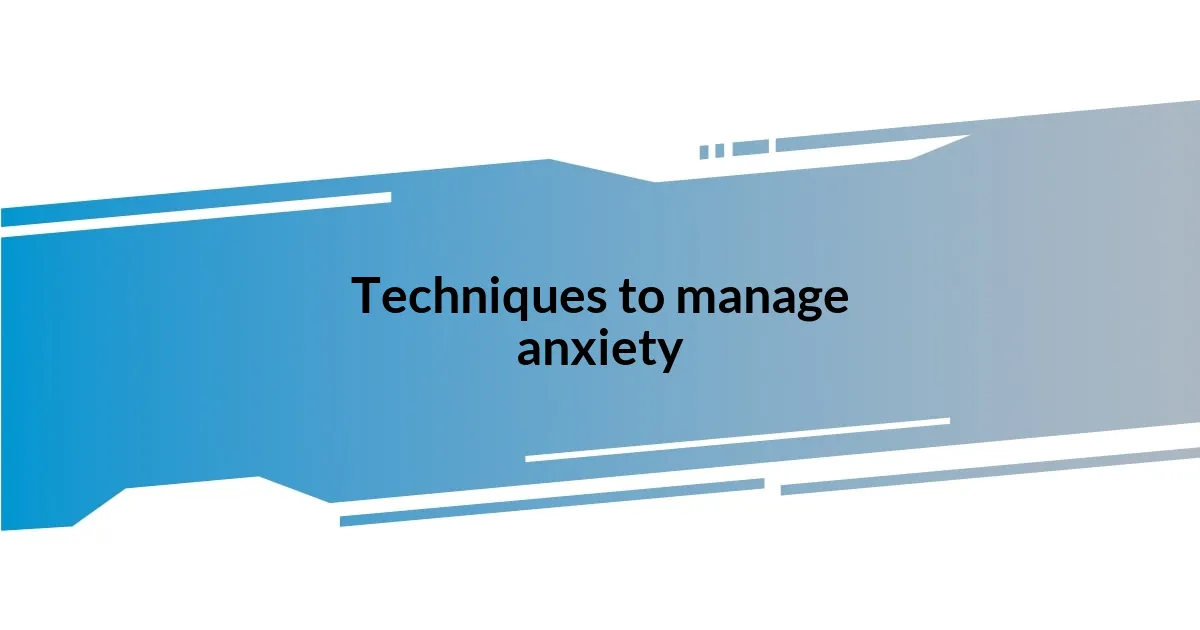
Preparing mentally for performance
When preparing mentally for performance, I often find that visualization is a powerful tool. Closing my eyes and imagining myself on stage, performing flawlessly, helps reshape my mindset. I remember a particularly nerve-racking dance recital; before stepping onto the stage, I pictured myself fully immersed in the movements, feeling the rhythm flow through me, and it made a world of difference.
Here are some techniques I use to mentally prepare:
- Deep breathing: I take slow, deep breaths to calm my racing mind and body.
- Positive affirmations: I remind myself of my strengths and abilities.
- Rehearsal: Practicing my performance multiple times boosts my confidence.
- Mindfulness: I focus on the present moment, letting go of negative thoughts.
- Self-reflection: After each performance, I reflect on what went well to create a positive feedback loop.
Taking the time to engage in these practices creates a mental landscape where I feel more in control and less anxious.
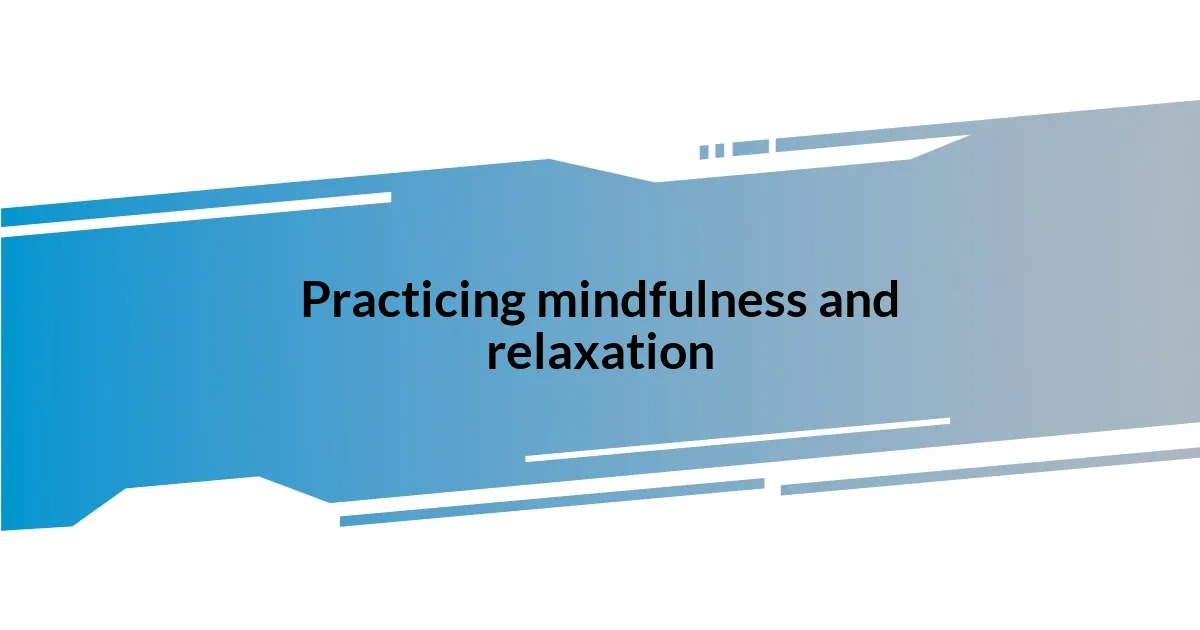
Techniques to manage anxiety
When it comes to managing anxiety, I’ve found grounding techniques to be incredibly helpful. Whenever I feel my nerves starting to spike, I take a moment to connect with my surroundings. For instance, I often focus on the texture of the chair I’m sitting on or the sounds around me. By anchoring my thoughts to the present, I disrupt the cycle of anxiety. Have you tried this? It can be surprisingly effective in pulling you back from the brink.
Another technique I rely on is creating a calming pre-performance ritual. For me, it involves a specific sequence of stretches, sipping herbal tea, and listening to a favorite playlist. Each action serves as a reminder that I’ve done this before and have the tools to succeed. I vividly recall a time when those steps transformed my mindset from anxious to excited before stepping into a crucial meeting. It felt like flipping a switch!
Lastly, I’ve discovered that reaching out for support can work wonders. Talking with a friend or mentor about my feelings often lightens the load. On one occasion, I shared my worries with a fellow performer right before a big show, and their reassurance helped me gain perspective. The right support can truly make a difference—who in your life could you lean on during those anxious moments? Remember, you’re never alone in facing performance anxiety.
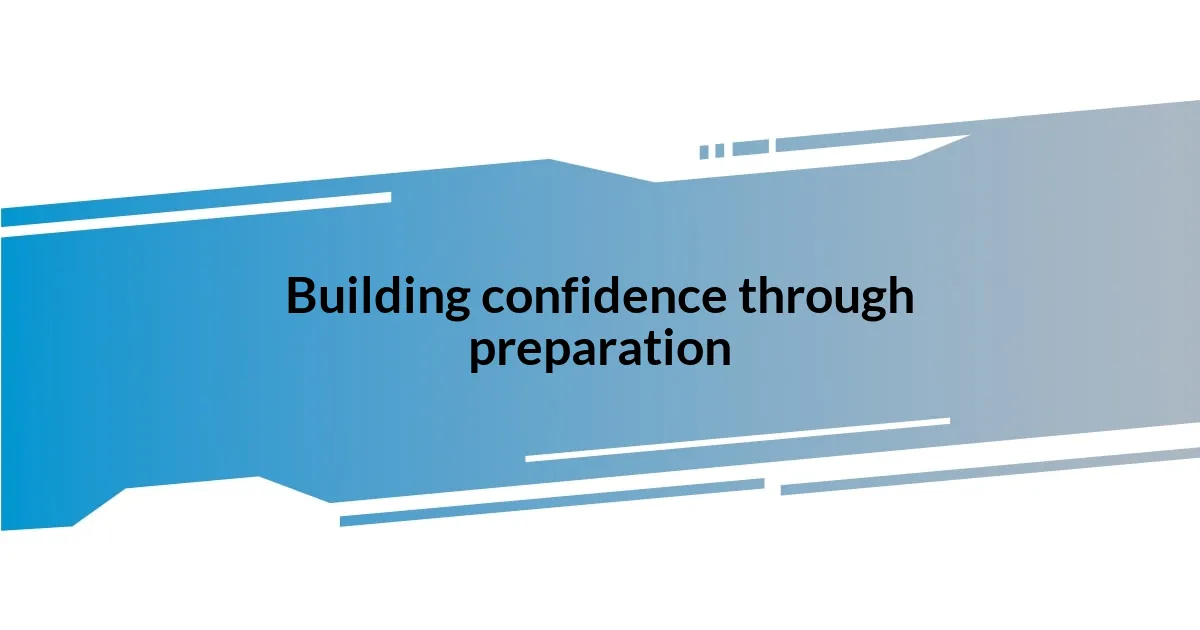
Building routine for success
Building a routine for success has been a game changer for me. I always set aside specific times for practice, which creates a structure that my mind can latch onto. For instance, when I was preparing for a major presentation, I developed a habit of rehearsing every morning over coffee; that simple, consistent act not only sharpened my delivery but also made me wake up feeling purpose-driven.
One aspect I’ve found vital is including a warm-up stage in my routine. Much like athletes who stretch before a game, I allow myself time to ease into the mental space I need. In the past, skipping this warm-up led to several stumbling blocks during my performances. Now, I embrace that quiet time to gather my thoughts, reminding myself that this ritual is not just a checkbox; it’s about preparing my whole self to shine.
Have you ever noticed how powerful a personalized soundtrack can be? I create playlists tailored to different types of performances, which helps me get into the right headspace. The last time I listened to my ‘confidence booster’ mix before a panel discussion, I felt an invigorating wave of energy wash over me. This small yet impactful addition to my routine helps remind me of my capabilities—music has a way of shifting our mindset, doesn’t it?

Utilizing relaxation methods
There’s something profoundly calming about practicing deep breathing techniques. I remember the first time I tried this before stepping on stage; my pulse was racing. I took a moment to inhale deeply through my nose, holding for a few counts, and then exhaling slowly. It felt as if I were releasing all that pent-up tension. Have you ever taken a moment just to breathe? It’s a simple yet powerful method that can ground you in the midst of chaos.
Progressive muscle relaxation is another strategy I’ve found invaluable. I recall a particularly nerve-wracking speech I had to deliver. Beforehand, I sat quietly, systematically tensing and relaxing each muscle group—from my toes to my shoulders. As I went through this process, I could feel the tension melting away, replaced by a warm sense of control. It’s amazing how our bodies hold onto stress; have you noticed that yourself? By intentionally releasing that stress, I can walk into any situation feeling more at ease.
Visualization also plays a key role in my relaxation toolkit. I often envision myself in a serene place before performances—such as a tranquil beach or a quiet forest. This mental escape provides a refreshing contrast to the anxiety swirling in my mind. I remember vividly picturing myself succeeding during a critical presentation, and it shifted my energy entirely. Have you ever tried visualizing your own success? It can transport you to a place of confidence that makes all the difference.
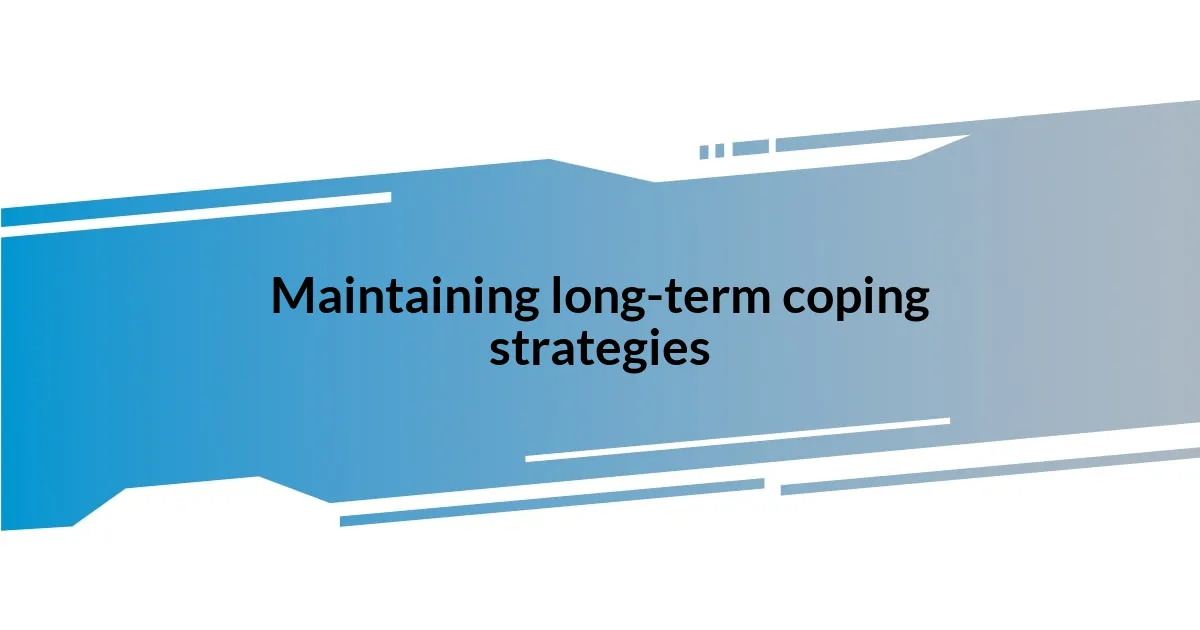
Seeking professional help when needed
Recognizing when to seek professional help is crucial in overcoming performance anxiety. I once found myself facing a critical moment when my anxiety felt insurmountable. A therapist I consulted helped me unravel the layers of my anxiety, giving me tools that not only alleviated my immediate fears but also built a sustainable approach to managing stress over time. Have you ever considered how a professional’s insights could reshape your perspective?
There’s no shame in reaching out for guidance; in fact, it can be a significant turning point. I vividly remember feeling hesitant at first, believing I could manage everything on my own. Yet, the sessions I attended transformed how I viewed my performance landscape. Through supportive conversations, I discovered the importance of self-compassion and learned techniques to reframe negative self-talk. Isn’t it fascinating how an outside perspective can shine light on things we can’t see ourselves?
Therapy isn’t one-size-fits-all, but finding a mental health professional who resonates with you can be incredibly empowering. After trying a few practitioners, I connected with someone who focused on mindfulness and anxiety management. The strategies we explored together, such as cognitive-behavioral techniques, have since become integral to my coping toolkit. Have you had experiences with mental health professionals that led to newfound clarity or strength? That journey can be vital in fostering both resilience and self-growth.